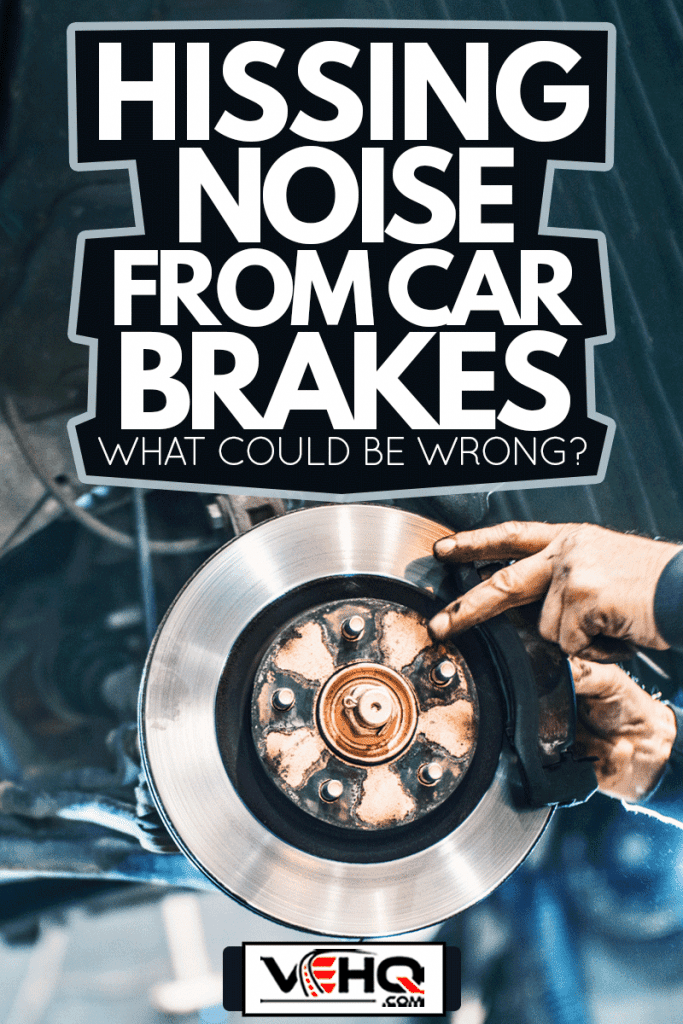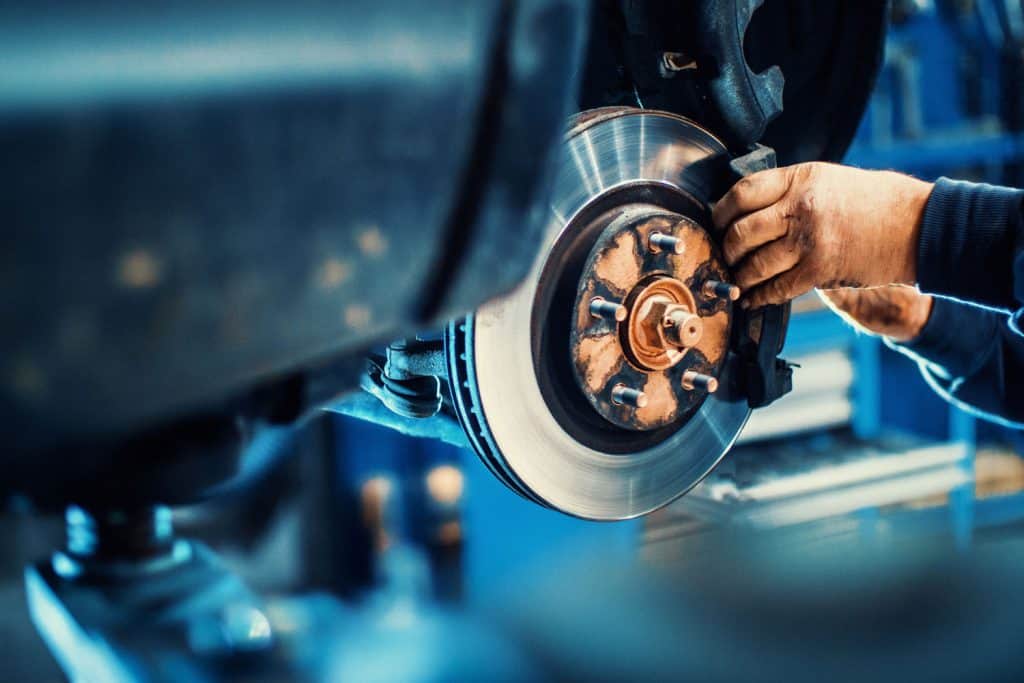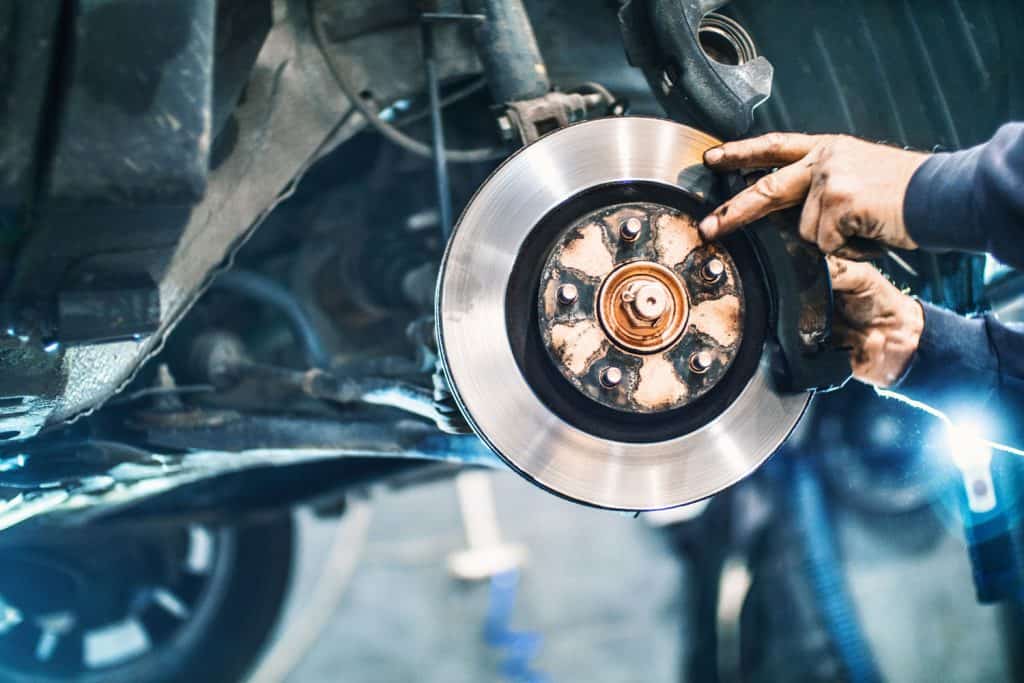It's no secret that your brakes are a vital part of driving safely. However, if you notice an abnormal noise such as a hissing sound coming from them, it probably raises some concerns. What could cause a hissing noise from your car brakes? Not to worry, because we have researched on your behalf to answer that question in this article!
If your car's brakes are making a hissing noise, this could be caused by a few things. Brakes rely on a vacuum pressure to do their job, so if there is a hissing noise, then there is more than likely a leak in one of the following:
- Brake Booster O-Ring
- Master Cylinder
- Vacuum Line
- Silencing Foam
- Booster Diaphram
This may seem like a long list of possible reasons you hear a hissing noise in your brakes. But, in this article, we will look at each of these issues to help understand why they are essential. In addition, we will discuss how to fix these issues, so read on!

Hissing Noise From Car Brakes—What Could Be Wrong
Before we discuss why your car brakes are hissing, let's first discuss how vehicle brakes work. A car's brakes are a system that uses a combination of brakes to slow down or stop a vehicle. There are two types of brake systems: The hydraulic and the cable-operated system.
The hydraulic brake is more effective than the cable-operated braking system because it uses hydraulic pressure, which is generated by the amount of force you apply on your brake pedal to put pressure on your brake pads through your brake fluids. When this system is applied, it generates heat that will eventually fade away.
The cable-operated braking system relies on the tension created by tightening wire cables to apply pressure to the brake pads directly. This braking system works differently because it does not use any fluid or heat but instead relies on the tension generated by applying tension on the cables.
Now that you understand how brakes work, let's look at the possible reasons why your vehicle brakes are hissing.

Brake Booster O-Ring
The first possible culprit for a hissing noise is the brake booster or O-Ring. If you experience a malfunctioning brake pedal, it usually means that your car will use the brake booster to assist in applying pressure on the pads to stop your vehicle.
This can cause a hissing noise that if there's air leakage in the brake booster, there would be a low vacuum pressure trying to create an equalized pressure inside. This can result in a hissing noise because it will indicate air coming through your car's brake system.
Master Cylinder
The second possible culprit for a hissing noise is the master cylinder seals. If you do not have an equalized pressure in your car's brake booster, then there would be a possibility that the master cylinder is leaking. This can result in low pressures on your brake system because of unequalized pressure, which can cause a hissing noise.
Vacuum Line
The third possible culprit for the hissing sound is cracks or damage in your vacuum line. If you want to test if this is the issue, check your brake lines for cracks and other damage where the pressure can escape.
Silencing Foam
One of the most common reasons why a hissing sound may occur is faulty silencing foam. This part usually comes in contact with pressure or heat, causing it to expand. If this happens, then you can hear a hissing sound because of the faulty silencing foam.
Booster Diaphram
The final reason you may hear a hissing noise is that your car's brake booster diaphragm may not be working correctly. This can cause a leak because it does not create the pressure to engage your brake system.
How do you Fix Hissing Brakes?
Now that you know the possible causes, it's time to fix your hissing brakes. If there is a reason why your car brakes are hissing, then you will need to bring your vehicle in for service so they can check out the issue and provide you with an accurate assessment of what needs to be done.
Unless you are a qualified mechanic, it may be challenging to isolate the problem on your own. What could happen is more bad than good, and you could be looking at more costs than what it would have been if you had taken it to a mechanic in the first place!
What Happens if the Brake Booster Goes Bad?
The brake booster is designed to assist the braking of your vehicle. As you press on your brakes, this causes pressure throughout the brake lines attached to each wheel. This helps create enough pressure so that when you stop applying pressure on your brake pedal, it can engage the brakes without any problems.
If you have a faulty brake booster, it could result from cracks and other damage in the system, low fluid levels (due to a leak), and/or faulty vacuum lines. This can cause your vehicle's brake system to malfunction to the point where it will not engage the brakes at all.
If you have a faulty brake booster, it is best to have the car towed to the nearest mechanic so they can fix it for you.
How do I Know if my Brake Booster Needs to be Replaced?
If your brake pedal feels too stiff and does not go down all of the ways when you hit it, then this could indicate a faulty brake booster.
You can also test your car's brake system and confirm this by depressing the brake pedal and stepping on it as hard as you can. There may be air in the lines if there is a hissing noise because of a leak, broken vacuum lines, or cracks in other parts of your vehicle's brake system.
To avoid having a faulty brake booster in your vehicle, it is crucial to check up on all other parts in the system regularly. This includes brake lines, brake fluid levels, and vacuum lines. In addition, make sure that you replace any components that show signs of wear and tear before they incur further damage to the system.
How Much Does it Cost to Replace a Brake Booster?
The cost of replacing a brake booster will vary depending on the vehicle and the extent of the issue. That is why a brake booster replacement can range anywhere from $300 to $700 (USD). These costs will also depend on what a mechanic will charge for an hour of labor in your area. Therefore, it is always worth shopping around and getting different price quotes to find the best deal!
The average lifespan of a brake booster can last anywhere from five to ten years. However, even if you do not drive your car often, it will still be affected by simple problems such as low fluid levels and broken vacuum lines. That is why you must inspect your vehicle for any signs of damage once every six months.
Can you Drive with Air in Brake Lines?
If there is air in your brake lines, it can affect the functionality of your brakes. Your car's brakes are designed to work on hydraulic pressure, which means that they need fluid to run correctly.
If you have air bubbles in your brake lines, this will cause problems with how well they activate. Not only that, but if you are driving along and your brake pedal suddenly goes down a few inches, there may be a leak in the system.
Final Thoughts

At the end of the day, the health of your brakes is essential for safe driving. For example, if you have a faulty brake booster, it isn't safe for you to be behind the wheel of your vehicle. That is why it is essential to make sure that all of your parts are in working order and replace any components before they show signs of wear and tear.
It always pays to regularly inspect your car's brake system every six months so you can avoid any issues. It would help if you also had a mechanic inspect your vehicle every year to make sure everything is in working order. If there is no damage to them thanks to lack of maintenance, low fluid levels, or other common problems.
If you like this article, then you should also check out:
Are Exhaust Brakes Hard On Engines?
